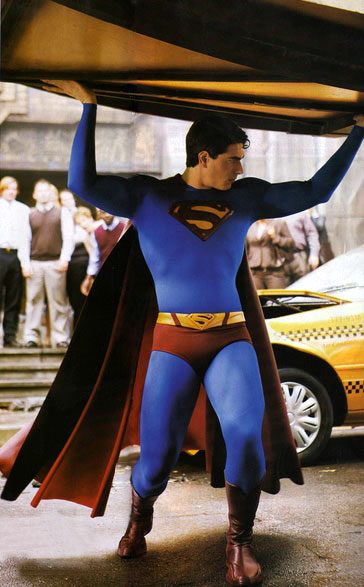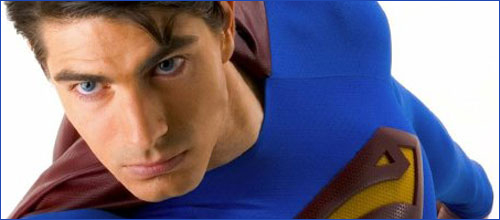Messianic Superman: Why the World Doesn't Need a Comicbook Savior
I watched the new Superman movie last night and thoroughly enjoyed it as a film, but less so as theology. Before I go there though let me say, go see this film. It's brilliantly conceived and directed by Bryan Singer with a good story and fantastic performances, especially by Kevin Spacey and Parker Posey.
The movie goes boldly into theological turf, and that's where it runs into trouble.
[Warning: Mild spoilers follow.]
 Lex Luthor, the antagonist, early on in the film compares himself to Prometheus, who stole fire from the gods. He starts the theological ball rolling by calling Superman a god stating that "Gods are selfish beings who fly around in little red capes and don’t share their power with mankind.” Throughout the film the disembodied voice of Marlon Brando as Superman's dad intones words of love and providence for his son who he has sent to earth to guide humankind. Only begotten son, anyone? Lois Lane herself, upset by Superman's sudden disappearance and reappearance, states that the world doesn't need a savior. And, towards the end of the film, Superman loses his strength and is set upon by thugs, beaten, and left for dead, but has a nigh miraculous recovery. Not quite crucifixion and resurrection, but the imagery is clear.
Lex Luthor, the antagonist, early on in the film compares himself to Prometheus, who stole fire from the gods. He starts the theological ball rolling by calling Superman a god stating that "Gods are selfish beings who fly around in little red capes and don’t share their power with mankind.” Throughout the film the disembodied voice of Marlon Brando as Superman's dad intones words of love and providence for his son who he has sent to earth to guide humankind. Only begotten son, anyone? Lois Lane herself, upset by Superman's sudden disappearance and reappearance, states that the world doesn't need a savior. And, towards the end of the film, Superman loses his strength and is set upon by thugs, beaten, and left for dead, but has a nigh miraculous recovery. Not quite crucifixion and resurrection, but the imagery is clear.
All pretty Christological stuff there.
 And Superman is a savior in a very classical sense. He is strong, good looking, clever, and brave. He is very much like Hercules. Parts of the story remind me very much of the stories from Judges about early hebrew heroes, especially Samson, when he loses his strength, due to a secret weakness, but then regains it in time to bring justice to his assailants. When Metropolis is struck with an earthquake the "Daily Planet" globe topples from the top of the newspaper building just so we can be reminded that, like Atlas, Superman has the weight of the world on his shoulders.
And Superman is a savior in a very classical sense. He is strong, good looking, clever, and brave. He is very much like Hercules. Parts of the story remind me very much of the stories from Judges about early hebrew heroes, especially Samson, when he loses his strength, due to a secret weakness, but then regains it in time to bring justice to his assailants. When Metropolis is struck with an earthquake the "Daily Planet" globe topples from the top of the newspaper building just so we can be reminded that, like Atlas, Superman has the weight of the world on his shoulders.
 And here is the theological problem I have with that - I can't believe in a savior like that. It doesn't meet the real world test. I'd love to have a superman in the world who would defeat the evildoers, protect the innocent, right wrongs, and be dashingly handsome while doing it, but they don't exist. That's not the world we live in. Jesus' followers were looking for Jesus to be a kind of superman. And why not? They were living under occupation by an oppressive regime. There was all sorts of violence and injustice in their day to day lives. If there was a time for a good dose of deus ex machina, that was it. But Jesus was not that kind of savior. He deliberately eschewed that kind of imagery and taught that societal problems would not be solved by the power of one man, but by the transformative power of loving community.
And here is the theological problem I have with that - I can't believe in a savior like that. It doesn't meet the real world test. I'd love to have a superman in the world who would defeat the evildoers, protect the innocent, right wrongs, and be dashingly handsome while doing it, but they don't exist. That's not the world we live in. Jesus' followers were looking for Jesus to be a kind of superman. And why not? They were living under occupation by an oppressive regime. There was all sorts of violence and injustice in their day to day lives. If there was a time for a good dose of deus ex machina, that was it. But Jesus was not that kind of savior. He deliberately eschewed that kind of imagery and taught that societal problems would not be solved by the power of one man, but by the transformative power of loving community.
The problem with superheroic saviors is that they feed into the myth of redemptive violence, that our world would be okay if only the bad guys would be squashed. It's a seductive myth that sells the idea that if only we were strong enough, smart enough, good looking enough, powerful enough, we could make the world's problems go away. It externalizes evil as a problem that must be erradicated for the world to return to a state of restful peace.
But there is nothing restful about peace. Peace is hard work that takes constant attention and practice. And there is nothing external about evil. Our struggle is with ourselves. Our struggle is within.
In the United States we are caught in the middle of just these paradigms. We have a superheroic ruling elite who have dedicated themselves to harnessing all of their powers to erradicating the evildoers from the world which they called a bid for "infinite justice." I really don't need that kind of savior. In fact, far from saving me, they are in the process of making the world more unstable.
On the other hand, I do agree with Superman that the world does need saving. Just not from a guy in tights and a cape. I can't abdicate that work to a government or superhero or god, it is my work, it is our work. Let's step to it.
[Related post - My Friend God May 17, 2006]


Comments
That is one take, not to give to much away in spoilers, but at one point when Superman is with Lois Lane...she says that the world doesn't need a savior and she doesn't need a savior. He takes her up into the air and shows her a city, and then he tells her that she may not, but still he hears the cries asking for a savior.
Wouldn't you also say the violence is more metaphorical than real. Lex Luthor as you say compares himself to Prometheus. Wouldn't you see the struggle not just a physical one (Superman battling Lex), but as a spiritual one the Son overcoming the falleness of the world (Evil expressed in greed through the form of Luthor).
Sure it contains elements of Greek mythos, but so does the Bible, so does most stories ever written from eternity on through the metanarrative. While it is convient nowadays to downplay the metanarrative with postmodern rejectionism...it still doesn't overcome the basic story in my humble opinion.
Br. Stephen
Posted by: Stephen | June 29, 2006 1:30 PM
But, Br Stephen, isn't the problem Br Lawrence is pointing to EXACTLY that the metanarrative, at the level of metanarrative, endorses the myth of redemptive violence? The issue isn't whether acts of physical violence are done in the film (as they are), but rather how or whether they are interpreted as being redemptive (or not).
The metanarrative of redemptive violence is, as Br Lawrence points out, precisely embedded in both the Prometheus myth AND in most comic book myths, as well as deep in the ways in which many nations have thought and talked about their own military and other violent responses. That myth , that metanarrative IS everywhere. But NOT in the gospel. Indeed, in the gospel, that myth is exposed for the failure that it is, and the truth of the cross is the strongest exposure (and rebuke!) of it.
Just a little grist for the mill...
Posted by: Br Taylor | June 29, 2006 9:06 PM
Yes, I agree with both points...redemptive violence is bad and does not need to be continued. The problem I am expressing is that the movie I saw I came away with a different impression.
It was not the redemptive violence one, but the sacrifice of oneself. Is not the gospel message the expression of love not through violence as some of the disciples wished, but through the sacrificial love of the cross?
*Spoiler Alert*
Superman in the end doesn't overcome evil with might, muscles, or speed...but through the sacrifice of his own life. I think Singer was trying to express this through the wonderful commentary from Brando tied into the film. In my humble opinion the shot that makes the film is the one framed by the sun as Superman relequishes his last breath and falls to earth arms outstretched. A savior not to destroy ones enemies, but to sacrfice ones own life for others (even Luthor).
Posted by: Stephen | June 30, 2006 7:48 PM
interesting post.
Posted by: Lorna | July 2, 2006 2:21 AM